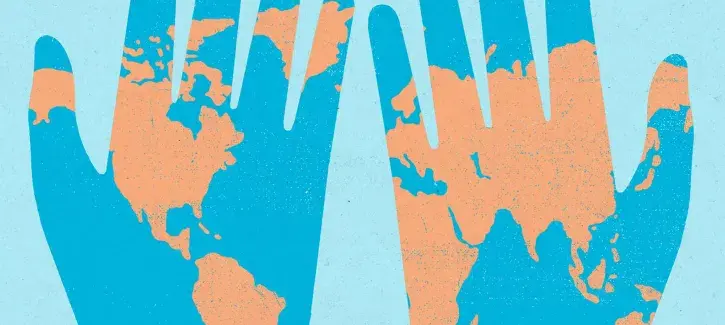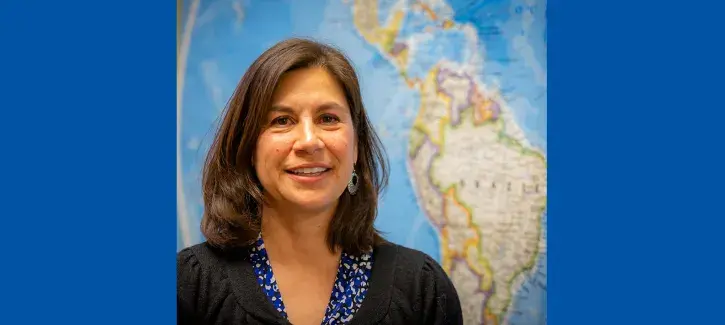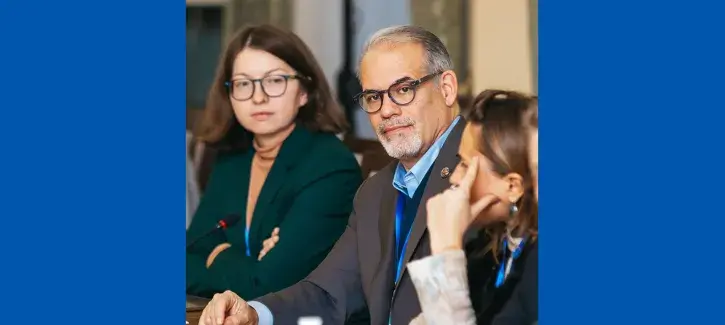
From Ukraine to Bolivia, Creighton professors defend human rights

The advance of democracy in nations that just 50 years ago were dominated by political or military dictatorships is a bright spot in world affairs that Creighton professors are at the forefront of studying and encouraging.
Michael Kelly, JD, LLM, professor of law, has built an international reputation in the field of human rights law, while Erika Moreno, PhD, chair of the Department of Political Science and International Relations, is a recognized expert on Latin American politics. In particular, she is an authority on how appointed or elected ombudsmen represent a bulwark against a resurgence of authoritarianism throughout Latin America.
Their expertise is a boon to Creighton students whose awareness of global affairs is kept current and relevant in the face of a rapidly changing world.
“Human rights, either in physical space or digital space, are essential to our well-being,” Kelly says. “If we expect our students to answer the Jesuit call to make life better for people by defending rights and pursuing justice, then we must lead by example.
“Last year, after defending internet human rights at a conference in Kyoto, Japan, and then wartime human rights at a conference in Lviv, Ukraine, I brought those experiences to the classroom, not to task my students with traveling half a world away into a war zone but to demonstrate that you must answer the call that inspires you to action.
“That’s exactly what St. Ignatius demonstrated for all of us. If you can have a positive impact as a force for good, do it, and maybe set the world on fire a little bit along the way.”
Moreno’s focus on Latin America, though far from the frozen tundra of Russia and Ukraine, is close in spirit to Kelly’s efforts to ensure that human rights prevail in formerly authoritarian regimes.

Through her contributions to academic publications Moreno’s scholarly interest in democratic accountability enhances awareness of the transition from autocracy to democracy.
“A lot of the conversation in the developing world is that many elected officials don’t really do what they are supposed to do,” Moreno says. “Demagogues are elected who block each other, generating gridlock. So, folks begin asking, ‘Who is actually running the show?’”
The advent of the ombudsman, an office that exists now in most Latin American nations, was meant to address that question. Ombudsmen are envisioned as standing above party politics. Invested with the power to investigate, to publicize and, as Moreno puts it, “to name and shame,” they are not judicial or law enforcement bodies endowed with the power to punish. They are, however, respected public voices whose conclusions carry weight.
Sometimes they are elected by legislatures, sometimes appointed by presidents. In some nations their roles are written into law, in others enshrined in constitutions. Although the respect granted the office can vary according to its constitutional standing, Moreno says the office of the ombudsman has proved universally effective not just by publicizing the excesses of elected bodies but also by addressing complaints from individual citizens about everyday matters such as pensions and water quality.
The greatest of these ombudsmen was Bolivia’s Ana María Romero de Campero, Moreno says, who proved so effective and achieved so high a reputation that a plaza in the capital city of La Paz — Plaza Ana María Romero de Campero — was dedicated to her memory in 2023.
“People said she should run for president she was so effective,” Moreno says. “In the early 2000s in Bolivia when there was a series of presidential crises — presidents in some cases fleeing the presidential palace — the legislature was not able to function, the judicial branch was incredibly slow and not necessarily autonomous of the political will, and so she played an incredibly important role in navigating some very, very tricky political terrain.”
Tricky political terrain is always a challenge for societies transitioning from authoritarianism to rule-of-law democracy, and nowhere is that more apparent than in the effort to preserve human rights in cyberspace, and, more terrestrially, in nations such as Ukraine that strive to establish identities separate from neighboring powers such as Russia.

Both these domains are Kelly’s focus, which has led to international involvement with academic bodies and with the United Nations.
Last October, Kelly presented his research to the United Nations’ internet Governance Forum meeting in Kyoto, Japan. His research took all 30 of the rights and freedoms embodied in the UN’s Universal Declaration of Human Rights — such as freedoms of speech, assembly and religion — and mapped them to the internet to create a guide as to how those liberties extend to online lives.
That new matrix adds to Kelly’s prominence in international law and reflects his role as co-chair of the American Bar Association’s Internet Governance Task Force.
“A lot has changed since the internet started,” Kelly says. “It really has taken on a life of its own. A third of people are online constantly, and well over 81% of people bop in and out of the internet all day long.
“So, if we are spending an increasing amount of our lifetime in digital space, then the question becomes, what rights follow us into that space?”
The rise of Big Tech has raised fundamental questions of liberty, Kelly says, as private companies increasingly supplant elected governments in deciding what liberties will be protected.
“Government control is really the first casualty of moving from physical space to digital space,” Kelly says. “Then there is the question of whether we use humans or algorithms to police cyberspace, or perhaps use AI. Artificial intelligence is a sharp sword that can be used to guarantee liberties, but the other side of that sword is just as sharp. China can use AI to repress you much more effectively than with algorithms. Authoritarian regimes are going to use it in a completely other direction.”
Kelly’s presence at the Kyoto conference and his presence at the Ukraine conference just days later illustrate his strong reputation in the field of international law.
The fate of Ukraine as it battles an expansionist Russia will say much about the future of that region, Kelly says. Ukraine is something of a bellwether since it alone among the republics of the former Soviet Union is trying to build a law-based democracy despite an autocratic history, he says.
“When the Soviet Union ended in 1991 the world got 15 new states, but only Latvia, Lithuania and Estonia were sustainable democracies,” Kelly says. “The reason those three succeeded in emerging as democracies is because they pre-existed the Soviet Union with a rule-of-law platform. That was embedded in who they were and how they ran things, so they have been able to reclaim that tradition.
“The other 12 nations never had that. Russia was a democracy for about a weekend under Boris Yeltsin and then it all fell apart. Why? Russia was never a rule-of-law society, and it isn’t today. So, its democracy was not sustainable.”
Ukraine, Kelly says, is the only one of the former Soviet republics that is eager to jettison its authoritarian past, and, while that effort has moved in fits and starts, the Russian invasion and a desire to join the European Union have strengthened efforts to root out judicial and financial corruption.
“Three things emerged for Ukraine from this invasion,” Kelly says. “I think they can be described as resistance, resilience and resurrection. The resistance component is this David and Goliath war where you have a relatively small country fighting off the world’s largest nuclear power and two years later is still resisting.”
He saw the resilience component at a Kiev hospital where injured children were fitted with prosthetic limbs. Known simply as “Unbroken,” the hospital is a beneficiary of international funds.
The resurrection component is a big one, he says. The World Bank estimates that the rebuilding of Ukraine will cost more than $410 billion, and Kelly would like to see frozen Russian assets help fund that project.
“Resistance, resilience and resurrection encapsulate what they are facing and what my trip to Ukraine was about,” he says. “We’ve got to make sure that foreign aid continues to help this country succeed.”




